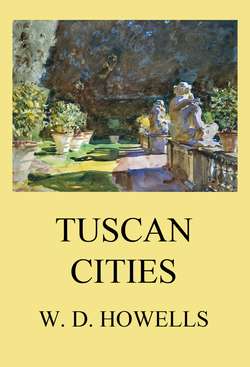Читать книгу Tuscan Cities - William Dean Howells - Страница 13
На сайте Литреса книга снята с продажи.
X
ОглавлениеYet if the reader had time, I would like to linger a little on our way down to the Via Borgo Santi Apostoli, where it branches off into the Middle Ages out of Via Tornabuoni, not far from Vieusseux's Circulating Library. For Via Tornabuoni is charming, and merits to be observed for the ensemble it offers of the contemporary Florentine expression, with its alluring shops, its confectioners and cafes, its florists and milliners, its dandies and tourists, and, ruggedly massing up out of their midst, the mighty bulk of its old Strozzi Palace, mediaeval, somber, superb, tremendously impressive of the days when really a man's house was his castle. Everywhere in Florence the same sort of contrast presents itself in some degree; but nowhere quite so dramatically as here, where it seems expressly contrived for the sensation of the traveler when he arrives at the American banker's with his letter of credit the first morning, or comes to the British pharmacy for his box of quinine pills. It is eminently the street of the tourists, who are always haunting it on some errand. The best shops are here, and the most English is spoken; you hear our tongue spoken almost as commonly as Italian, and much more loudly, both from the chest and through the nose, whether the one is advanced with British firmness to divide the groups of civil and military loiterers on the narrow pavement before the confectioner Giacosa's, or the other is flattened with American curiosity against the panes of the jewelers' windows. There is not here the glitter of mosaics which fatigues the eye on the Lungarno or in Via Borgognissanti, nor the white glare of new statuary — or statuettary, rather — which renders other streets impassable; but there is a sobered richness in the display, and a local character in the prices which will sober the purchaser.
Florence is not well provided with spaces for the outdoor lounging which Italian leisure loves, and you must go to the Cascine for much Florentine fashion if you want it; but something of it is always rolling down through Via Tornabuoni in its carriage at the proper hour of the day, and something more is always standing before Giacosa's English-tailored, Italian-mannered, to bow, and smile, and comment. I was glad that the sort of swell whom I used to love in the Piazzi at Venice abounded in the narrower limits of Via Tornabuoni. I was afraid he was dead; but he graced the curbstone there with the same lily-like disoccupation and the same sweetness of aspect which made the Procuratie Nuove like a garden. He was not without his small dog or his cane held to his mouth; he was very, very patient and kind with the aged crone who plays the part of Florentine flower-girl in Via Tornabuoni, and whom I after saw aiming with uncertain eye a boutonniere of violets at his coat-lapel; there was the same sort of calm, heavy-eyed beauty looking out at him from her ice or coffee through the vast pane of the confectioner's window, that stared sphinx-like in her mystery from a cushioned corner of Florian's; and the officers went by with tinkling spurs and sabers, and clicking boot-heels, differing in nothing but their Italian uniforms and complexions from the blonde Austrian military of those far-off days. I often wondered who or what those beautiful swells might be, and now I rather wonder that I did not ask someone who could tell me. But perhaps it was not important; perhaps it might even have impaired their value in the picture of a conscientious artist who can now leave them, without a qualm, to be imagined as rich and noble as the reader likes. Not all the frequenters of Doney's famous café were both, if one could trust hearsay. Besides those who could afford to drink the first sprightly runnings of his coffee-pot, it was said that there was a genteel class, who, for the sake of being seen to read their newspapers there, paid for the second decantation from its grounds, which comprised what was left in the cups from the former. This might be true of a race which loves a goodly outside perhaps a little better than we do; but Doney's is not the Doney's of old days, nor its coffee so very good at first hand. Yet if that sort of self-sacrifice goes on in there, I do not object; it continues the old Latin tradition of splendor and hunger which runs through so many pleasant books, and is as good in its way as a beggar at the gate of a palace. It is a contrast; it flatters the reader who would be incapable of it; and let us have it. It is one of the many contrasts in Florence which I spoke of, and not all of which there is time to point out. But if you would have the full effect of the grimness and rudeness of the Strozzi Palace (drolly parodied, by the way, in a structure of the same street which is like a Strozzi Palace on the stage), look at that bank of flowers at one corner of its base, — roses, carnations, jonquils, great Florentine anemones, — laying their delicate cheeks against the savage blocks of stone, rent and burst from their quarry, and set here with their native rudeness untamed by hammer or chisel.
